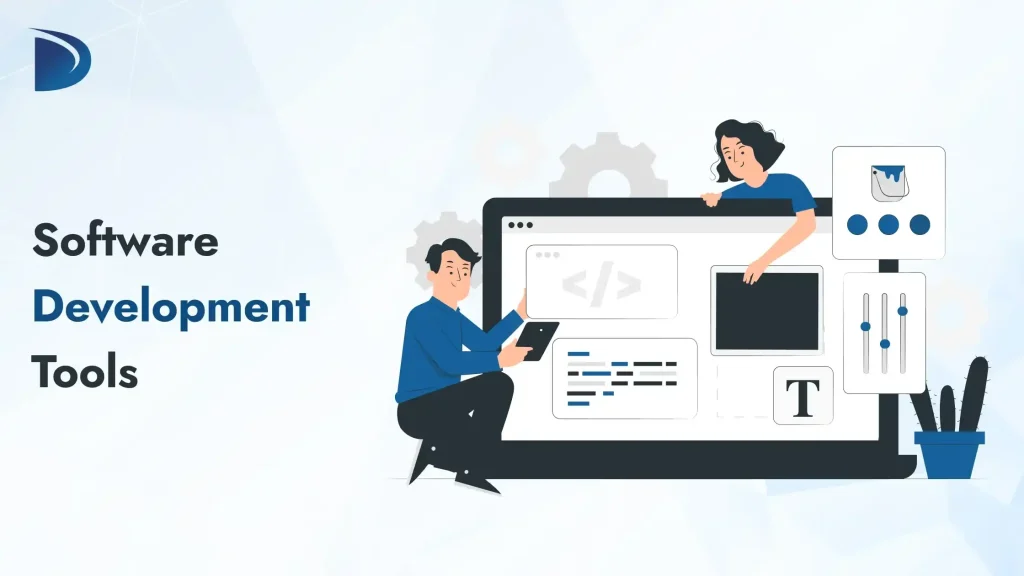Table of Contents
Creating great software development requires user-friendly apps or websites that offer smart tools for writing and debugging code, identifying bugs, automating tasks, promoting teamwork, and ensuring everything works properly before launch. Using the best software development tools makes each step of the process faster, smoother, and more adaptable for growth.
In this blog, we answer the question, “What are software development tools?” and explore the different types available, as well as how we at Differenz System use them to build everything without losing our minds.
What Are Software Development Tools?
Software development tools are applications and platforms that help developers build, test, and maintain software more efficiently. They include code editors, version control systems, testing frameworks, deployment tools, and more – essential gear that keeps projects moving.
They handle everything from writing code to detecting bugs before users encounter them. With today’s specialized needs, whether you’re using Android app development tools, iOS app development tools, or advanced AI tools for productivity, choosing the right combination of software development tools can determine your project’s success.
Categories of Software Development Tools
Code Editors and IDEs
This is where the magic of coding begins. Tools like VS Code and Android Studio help developers write, edit, and debug code efficiently. For mobile apps, Android and iOS development tools offer tailored environments to streamline coding, preview interfaces, and catch errors before they become real problems.
Recommended Tools:
- Visual Studio Code
- Android Studio
- Xcode
- IntelliJ IDEA
Version Control Systems
Version control tools like Git and GitHub help teams track code changes, collaborate efficiently, and roll back changes when needed. They are essential for all projects, from backend systems to educational app development tools, keeping every update organized and conflict-free across teams and timelines.
Recommended Tools:
- Git
- GitHub
- GitLab
- Bitbucket
Build and Automation Tools
Build tools like Maven, Gradle, and Webpack automate tasks such as compiling code, managing dependencies, and creating deploy-ready packages. They are essential in both frontend and backend development workflows, especially when applications need to ship quickly and remain bug-free. Automating these steps keeps your project on schedule and scalable.
Recommended Tools:
- Gradle
- Maven
- Webpack
- Gulp
Testing Tools
Before your software reaches users, it must be thoroughly tested. Tools such as Selenium, JUnit, and Postman are part of the Mobile App and Web App Testing Tools family, ensuring functionality across devices, browsers, and edge cases. They help identify bugs early and improve product stability.
Recommended Tools:
- Selenium
- JUnit
- Postman
- Cypress
Continuous Integration/Deployment (CI/CD)
CI/CD tools like Jenkins, CircleCI, and GitHub Actions automate building, testing, and deploying code. They are essential for agile teams and frequent updates. Whether releasing AI tools for productivity or a new learning app, CI/CD ensures a smooth flow from commit to production.
Recommended Tools:
- GitHub Actions
- Jenkins
- CircleCI
- GitLab CI/CD
Project Management & Collaboration
Keeping everyone on the same page is easier with tools like Jira, Trello, and Slack. These tools help manage tasks, track bugs, and streamline team communication. From planning frontend development to coordinating mobile and web teams, collaboration platforms keep things running smoothly, even on tight deadlines.
Recommended Tools:
- Jira
- Trello
- Asana
- Slack
Database Management Tools
Tools like MySQL Workbench and MongoDB Compass help developers create, query, and maintain databases. They are essential for managing structured and unstructured data, such as user information in a mobile app or student progress in educational app development. Improved data management leads to faster insights and fewer issues.
Recommended Tools:
- MySQL Workbench
- MongoDB Compass
- pgAdmin
- DBeaver
API Design & Testing
APIs power modern apps, and tools like Postman and Swagger help build and test them efficiently. They are useful for connecting web design tools, mobile apps, and third-party services. Robust APIs deliver smoother user experiences, fewer errors, and faster integration across all app components.
Recommended Tools:
- Postman
- Swagger (OpenAPI)
- Insomnia
- Stoplight
Key Benefits for Businesses
Faster Time to Market
Using the right frontend development tools helps businesses design and deliver polished user interfaces efficiently. These tools reduce repetitive tasks, speed up testing, and enable teams to iterate quickly, bringing products to customers ahead of the competition.
Better Product Quality
With reliable mobile app and web app testing tools, you can catch bugs before they become costly. Consistent testing ensures your software works seamlessly across devices, browsers, and user conditions, boosting quality and customer satisfaction from the start.
Cost Efficiency
Choosing an efficient backend development tool minimizes manual tasks, reduces errors, and optimizes server-side performance. This leads to fewer development hours spent on fixes and more focus on growth and features, maximizing return on investment.
Increased Team Productivity
AI tools for productivity streamline everything from code generation to documentation. They automate repetitive tasks, offer smart suggestions, and help troubleshoot issues more quickly, allowing your team to focus on innovation instead of mundane tasks.
Easier Cross-Platform Development
When building for both Android and iOS, using the appropriate tools for Android and iOS app development ensures seamless workflows. This unified approach reduces overhead, avoids duplication, and helps maintain consistent app behavior across devices.
Scalability and Flexibility
By using web design tools effectively, your product remains adaptable as user needs change. These tools support responsive, accessible, and scalable designs that grow with your business.
Specialized Solutions for Niche Markets
If you’re building something focused, using targeted app development tools gives you an edge. These tools are designed for learners, enabling you to launch interactive, scalable solutions that support real educational outcomes.
How Does the Differenz System Use These Tools Effectively?
At Differenz System, we’ve learned that the right tools not only make the job easier but also improve the final product. Every app, platform, or product we build has unique needs, and we match those with the right stack from the start.
Our team stays organized, tested, and productive with tools that support clean code, faster deployment, and strong collaboration. We use tools that help us work smarter and continually refine our approach to remain flexible and efficient.
Choosing the Right Tools for Your Project
| Project Need | What to Look For | Recommended Tool Types |
| Building a mobile app | Platform compatibility, performance, UI support | Android/iOS Development Tools |
| Launching a responsive website | Design flexibility, component libraries, SEO readiness | Frontend & Web Design Tools |
| Managing backend operations | Test coverage, device/browser compatibility, and automation | Backend Development Tools |
| Ensuring quality before release | Task tracking, version control, and real-time communication | Mobile & Web App Testing Tools |
| Collaborating with a distributed team | Code Editors, Build Tools. Low-code platforms | Project Management & Version Control Tools |
| Rapid prototyping or MVP development | Speed, ease of use, integration options | Interactive features, content delivery, and progress tracking |
| Education or learning app development | Tools for Building Educational Apps | Tools for Building Educational Apps |
| Boosting dev team efficiency | Automation, smart suggestions, integrated workflows | AI tools for productivity, CI/CD tools |
Conclusion
Here is an open secret everyone knows. Building software isn’t about having a mystical all-in-one tool that does everything for you. It’s about understanding your project’s needs and choosing the right tools.
At Differenz System, we don’t pretend to be superhuman. Think of us as your go-to team that shows up with the right tools, asks the right questions, and gets things done.
Could you build without tools? Sure. You could also trim your lawn with a pair of scissors. But why do that? If you’re ready to build smarter, let’s talk.
FAQs
What are the best tools for beginners in software development?
For beginners, start with user-friendly tools such as Visual Studio Code (a code editor), Git (version control), and Postman (an API testing tool). These are easy to learn, widely used, and support most projects.
How do I determine which tools are best suited for my project?
Start by defining your project’s goals, timeline, and team size. Then consider the platform, features, and scalability. If you’re unsure, a tech partner like Differenz System can help you choose a stack that fits your needs.
Can using too many tools slow down development?
Absolutely. More tools mean more complexity. The key is balance: use only what truly adds value. At Differenz System, we believe in keeping the stack lean and focused to avoid tool overload.
Why are version control tools like Git important?
Version control tools track code changes, enable teams to collaborate without conflicts, and let you undo mistakes. Git keeps your project organized and secure.
How do CI/CD tools help in software development?
CI/CD tools, such as Jenkins and GitHub Actions, automate building, testing, and deploying code. They save time, reduce errors, and help release updates faster.
What’s the difference between code editors and IDEs?
Code editors (like VS Code) are lightweight and focus on writing code. IDEs (such as Android Studio) are more powerful, with built-in tools for debugging, testing, and building applications.
Are free software development tools good enough?
Yes, many free tools, such as VS Code, Git, and Selenium, are high-quality and widely used. They work well for most projects, but paid tools may offer additional features for advanced needs.
How do testing tools improve app quality?
Testing tools like Selenium and JUnit catch bugs before launch by checking how your app works on different devices and in various scenarios. This helps ensure a smooth user experience.
What tools should I use for building a mobile app?
Use Android Studio for Android apps, Xcode for iOS apps, and testing tools such as Cypress or Postman. These tools help you code, design, and test apps efficiently.
Can AI tools make software development faster?
Yes, AI tools like GitHub Copilot suggest code, automate repetitive tasks, and quickly fix errors. They increase productivity and allow developers to focus on creative work.
How do I choose tools for a small development team?
Choose simple, versatile tools like Trello for project management, GitHub for version control, and VS Code for coding. Prioritize tools that are easy to use and integrate smoothly.
What are the best tools for building educational apps?
Use Android Studio or Xcode for mobile app development, along with tools like Firebase for data management and APIs. These tools support interactive features and effectively track user progress.
How do collaboration tools help remote dev teams?
Tools like Slack, Jira, and Asana keep remote teams connected, track tasks, and manage deadlines. They ensure everyone stays aligned, even across time zones.
Why organizebase management tools in development?
Tools like MySQL Workbench and MongoDB Compass make it easier to store, organize, and retrieve data. They help your app manage user information efficiently.
Can I use the same tools for frontend and backend development?
Some tools, such as VS Code and Git, are compatible with both. However, the frontend needs tools like Webpack for design, while the backend requires tools like Maven for server-side tasks.
How do I avoid using too many tools in a project?
Focus on your project’s needs and choose tools that handle multiple tasks. Avoid overlap by testing tools first and maintaining a lean, efficient stack.
What tools help with rapid prototyping for startups?
Use tools such as Figma for UI design, Postman for APIs, and low-code platforms like Bubble. These tools help you build and test prototypes quickly.

